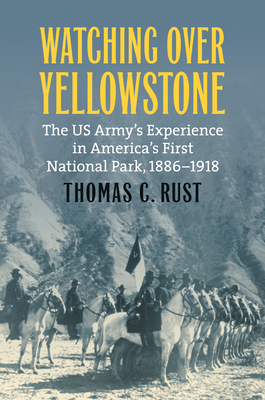When, in 1883, Congress charged the US Army with managing Yellowstone National Park, soldiers encountered a new sort of hostility: work they were untrained for, in a daunting physical and social environment where they weren't particularly welcome. When they departed in 1918, America had a new sort of serviceman: the National Park Service Ranger. From the creation of Yellowstone National Park to the conclusion of the army's superintendence,
Watching over Yellowstone tells the boots-on-the-ground story of the US troops charged with imposing order on man and nature in Americaâ (TM)s first national park.
Yellowstone National Park had been created only fourteen years before Captain Moses Harris arrived at Mammoth Hot Springs with his company, Troop M of the First United States Cavalry, in August of 1886. And in those years, the underfunded, poorly supervised park had been visited freely by over-eager tourists, vandals, and poachers. Thomas C. Rust describes the task confronting Congress, military superintendents, and the common soldiers as the ever-increasing number of tourists, commercial interests, and politics stained the unruly park. At a time when the army was already undergoing a great transformation, the common soldiers were now struggling with unusual duties in unfamiliar terrain, often in unaccustomed proximity to the social elite who dominated the tourist class--fertile if uncertain ground for both the failures and the successes that eventually shaped the National Park Service's ranger corps. What this meant for the average soldier emerges from the materials Rust consults: orders, circulars, inspection reports, court-martial cases, civilian accounts, and evidence from excavated soldier stations in the park. A nuanced social history from a rare ground-level perspective, his book captures an extraordinary moment in the story of America's military and its national parks.











